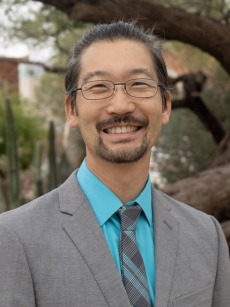
Dr. Brett J. Esaki (Ph.D. in Religious Studies, University of California, Santa Barbara) specializes in Asian American studies, with a focus on spirituality, popular culture, and comprehensive sustainability. He focuses on methods to examine religion on the ground, especially ethnography, cultural studies, and subjugated history. His publications detail how American minorities, including Asian Americans and African Americans, creatively use religion and art to preserve, to reinvent, and to discover a sense of their full humanity. He is the author of Enfolding Silence: The Transformation of Japanese American Religion and Art under Oppression (Oxford 2016). Dr. Esaki's teaching specialties include Asian American religions; religion and popular culture, including hip hop and other embodied arts; and history, ideology, and philosophy of race and in the United States.

